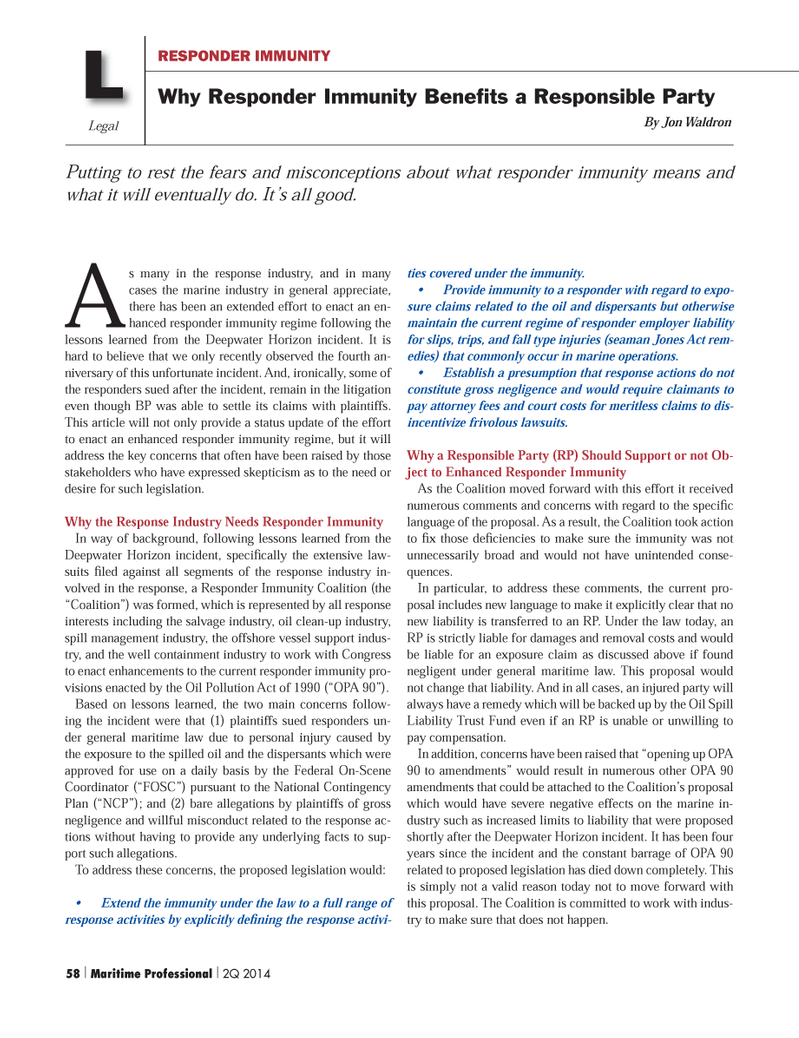
Page 58: of Maritime Logistics Professional Magazine (Q2 2014)
Maritime Risk & Shipping Finance
Read this page in Pdf, Flash or Html5 edition of Q2 2014 Maritime Logistics Professional Magazine
A s many in the response industry, and in many cases the marine industry in general appreciate, there has been an extended effort to enact an en- hanced responder immunity regime following the lessons learned from the Deepwater Horizon incident. It is hard to believe that we only recently observed the fourth an- niversary of this unfortunate incident. And, ironically, some of the responders sued after the incident, remain in the litigation even though BP was able to settle its claims with plaintiffs.
This article will not only provide a status update of the effort to enact an enhanced responder immunity regime, but it will address the key concerns that often have been raised by those stakeholders who have expressed skepticism as to the need or desire for such legislation.
Why the Response Industry Needs Responder Immunity
In way of background, following lessons learned from the
Deepwater Horizon incident, specifi cally the extensive law- suits fi led against all segments of the response industry in- volved in the response, a Responder Immunity Coalition (the “Coalition”) was formed, which is represented by all response interests including the salvage industry, oil clean-up industry, spill management industry, the offshore vessel support indus- try, and the well containment industry to work with Congress to enact enhancements to the current responder immunity pro- visions enacted by the Oil Pollution Act of 1990 (“OPA 90”).
Based on lessons learned, the two main concerns follow- ing the incident were that (1) plaintiffs sued responders un- der general maritime law due to personal injury caused by the exposure to the spilled oil and the dispersants which were approved for use on a daily basis by the Federal On-Scene
Coordinator (“FOSC”) pursuant to the National Contingency
Plan (“NCP”); and (2) bare allegations by plaintiffs of gross negligence and willful misconduct related to the response ac- tions without having to provide any underlying facts to sup- port such allegations.
To address these concerns, the proposed legislation would: Extend the immunity under the law to a full range of response activities by explicitly defi ning the response activi- ties covered under the immunity. Provide immunity to a responder with regard to expo- sure claims related to the oil and dispersants but otherwise maintain the current regime of responder employer liability for slips, trips, and fall type injuries (seaman Jones Act rem- edies) that commonly occur in marine operations. Establish a presumption that response actions do not constitute gross negligence and would require claimants to pay attorney fees and court costs for meritless claims to dis- incentivize frivolous lawsuits.
Why a Responsible Party (RP) Should Support or not Ob- ject to Enhanced Responder Immunity
As the Coalition moved forward with this effort it received numerous comments and concerns with regard to the specifi c language of the proposal. As a result, the Coalition took action to fi x those defi ciencies to make sure the immunity was not unnecessarily broad and would not have unintended conse- quences.
In particular, to address these comments, the current pro- posal includes new language to make it explicitly clear that no new liability is transferred to an RP. Under the law today, an
RP is strictly liable for damages and removal costs and would be liable for an exposure claim as discussed above if found negligent under general maritime law. This proposal would not change that liability. And in all cases, an injured party will always have a remedy which will be backed up by the Oil Spill
Liability Trust Fund even if an RP is unable or unwilling to pay compensation.
In addition, concerns have been raised that “opening up OPA 90 to amendments” would result in numerous other OPA 90 amendments that could be attached to the Coalition’s proposal which would have severe negative effects on the marine in- dustry such as increased limits to liability that were proposed shortly after the Deepwater Horizon incident. It has been four years since the incident and the constant barrage of OPA 90 related to proposed legislation has died down completely. This is simply not a valid reason today not to move forward with this proposal. The Coalition is committed to work with indus- try to make sure that does not happen.
Legal
RESPONDER IMMUNITY
Why Responder Immunity Benefi ts a Responsible Party
L
By Jon Waldron
Putting to rest the fears and misconceptions about what responder immunity means and what it will eventually do. It’s all good. 58 | Maritime Professional | 2Q 2014 50-63 Q2 MP2014.indd 58 5/16/2014 3:01:56 PM

 57
57

 59
59
